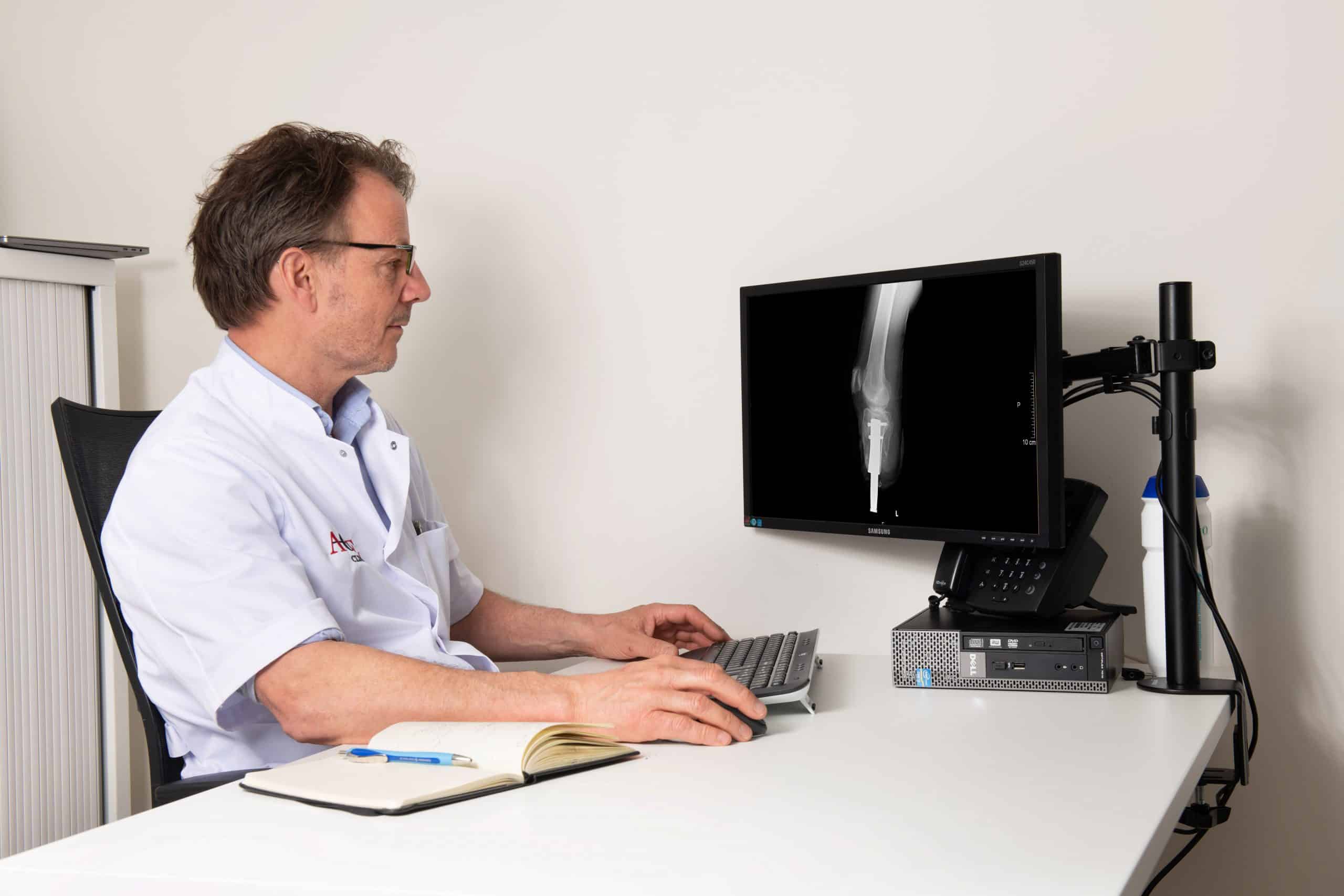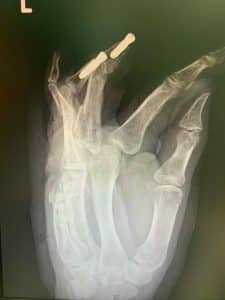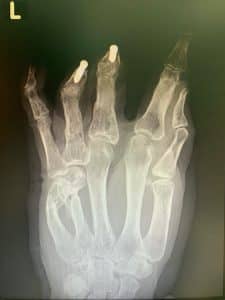
Prosthesis for fingers at AOFE Clinics
At AOFE Clinics, we understand the significant impact that finger amputations can have on a person’s daily life and self-confidence. We are proud to offer innovative solutions, including Osseointegration Surgery Prosthesis, to our patients seeking to regain optimal functionality and natural appearance of their hands.
There are several reasons why someone might lose their fingers, including:
- Trauma: Accidents, such as crushing injuries, burns, and cuts, can result in the loss of one or more fingers.
- Infection: In some cases, severe infections can lead to tissue damage and the need for amputation of the affected finger(s).
- Circulatory problems: Conditions that affect blood flow to the fingers, such as frostbite, Raynaud’s disease, and peripheral artery disease, can cause tissue damage and the need for amputation.
- Cancer: Rarely, certain types of cancer, such as sarcoma, can require the removal of fingers as part of the treatment.
- Congenital abnormalities: Some people may be born with missing fingers or have fingers that do not fully form, a condition known as polydactyly or syndactyly.
- Autoimmune conditions: Certain autoimmune conditions, such as scleroderma, can cause tissue damage and the need for amputation.
When you loose fingers, you loose the ability to perform everyday tasks, and may require specialized medical care, including prosthesis for fingers or other assistive devices, and rehabilitation to help improve function and quality of life. Other simlar reasons to contact AOFE Clinics are hand prosthesis, finger amputations and a prosthetic finger ( or finger prostheses ).
AOFE's five guarantees
- We listen to you and take a personalised approach
- Our care meets the strictest quality standards
- We always work with experience experts
- We work with you to find the best suited solution
- You benefit from reduced waiting times with us
How can osseointegration surgery help people with loss of fingers
Osseointegration surgery may not be the best option for people who have lost fingers, as it requires the insertion of a metal implant into the bone, which is not possible for small bones such as those in the fingers. However, there are other surgical options that can help people with no fingers, such as finger replantation, toe-to-hand transplantation, and composite tissue transplantation.


Finger replantation is a surgical procedure that involves reattaching a severed finger using microsurgery techniques. This procedure is typically performed within a few hours of the injury and requires specialized training and equipment.
Toe-to-hand transplantation is a surgical procedure that involves transplanting a toe onto the hand to replace a missing finger. This procedure is typically reserved for people who have lost multiple fingers and may require extensive rehabilitation to regain function.
Composite tissue transplantation involves transplanting a combination of tissues, including bone, muscle, and skin, from one part of the body to another. This procedure can be used to replace missing fingers and may provide better functional outcomes than other surgical options.
In addition to surgery, people with no fingers may benefit from the use of prosthetic fingers or other assistive devices, as well as rehabilitation to help improve the quality of life. A healthcare professional can help determine the best treatment options based on individual needs and preferences.
The benefits of osseointegration surgery prosthesis:
Osseointegration surgery for finger amputations is a revolutionary procedure that allows patients to experience a high level of functionality and a natural appearance. By integrating a prosthetic device directly into the bone, this advanced technique provides numerous benefits, including:
- Increased Length and Dexterity: With osseointegration, patients can regain the length of their fingers, which is crucial for performing various tasks that require precision and manipulation. The improved dexterity enables individuals to confidently handle objects, write, type, and perform daily activities with greater ease.
- Enhanced Fit and Comfort: Osseointegrated prosthetics are custom-designed to fit each patient’s unique anatomy. The prosthetic device is tailored to match the size, shape, and contours of the individual’s residual finger or thumb, ensuring a comfortable and secure fit. This customized approach promotes long-term usage without discomfort or slippage.
- Natural Appearance: The aesthetic aspect is equally important for our patients. Osseointegrated prosthetics are meticulously designed to closely resemble the natural appearance of the hands. The use of high-quality materials, such as silicone, allows for a realistic texture, color, and even nail detailing, ensuring a visually appealing result.
- Increased Upper Limb Functionality: Osseointegration surgery not only benefits finger amputations but also provides opportunities for integrated upper limb prosthetics. This means that patients with more extensive upper limb amputations can benefit from an integrated solution that enhances the overall functionality of the arm, hand, and fingers.
Our patient-centric approach
At AOFE Clinics, we prioritize patient education and engagement throughout the osseointegration journey. We take the time to learn about your specific needs, preferences, and goals. Our team of experts guides you through the process, providing you with resources and information to make informed decisions regarding the prosthetic design, functionality, and appearance. By choosing osseointegration surgery for finger amputations at AOFE Clinics, you are choosing a new chapter in your life. Our dedicated team of specialists, including surgeons and prosthetics experts, is committed to providing you with the highest level of care and support, ensuring that you achieve the best possible outcome and regain your independence.
Learn more and take the next step
If you are seeking a customized, high-functioning, and natural-looking solution for finger amputations, osseointegration surgery may be the answer you’ve been searching for. Contact AOFE Clinics today to schedule a consultation and explore the possibilities that lie ahead. Together, we can create a tailored plan that fits your needs and helps you achieve a more fulfilling life.
